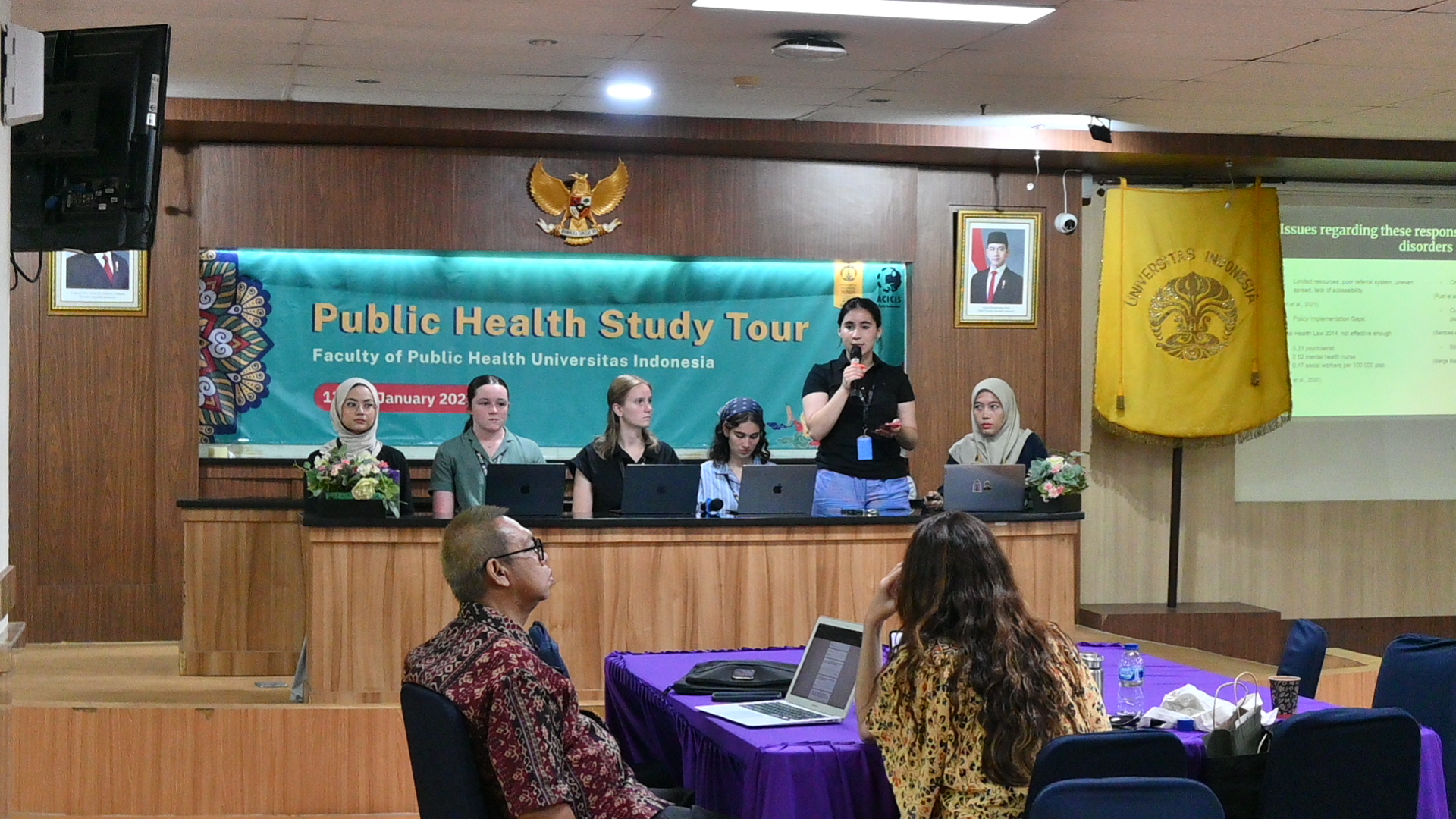On Wednesday, January 18, 2025, the Faculty of Public Health (FPH) at Universitas Indonesia (UI) held a final presentation as part of the Public Health Study Tour (PHST), a program in collaboration between FPH UI and the Australian Consortium for ‘In-Country’ Indonesian Studies (ACICIS). This program is an inbound study program designed for Australian students interested in studying public health in Indonesia. The PHST took place over two weeks, during which participants had the opportunity to engage in various activities such as interactive lectures, visits to healthcare facilities, and field observations at organizations and communities. The culmination of the program at FPH UI was on Saturday, January 18, when Australian students presented the results of their discussions during the final presentation session.
The students presented a wide range of topics during the presentation, along with recommendations regarding public health issues in Indonesia. The event was attended by FPH UI faculty members, including Prof. Dr. dr. Sabarinah Prasetyo, M.Sc., who expressed appreciation for the contributions and fresh perspectives brought by the participants. This program is an important step in supporting the academic reputation of FPH UI internationally.
Mental health in Indonesia was one of the key topics discussed, focusing on the importance of increasing public awareness, removing stigma, and expanding access to mental health services. This highlighted that mental health is an integral part of community well-being that is often overlooked. Additionally, stunting in Indonesia was also a major concern, especially due to its impact on the projected demographic bonus expected to peak between 2025–2035. According to the WHO, stunting is defined as a condition where a child’s height or length is below -2 standard deviations (SD) from the child growth standard, and it can hinder the productivity of the working-age population while increasing the risk of chronic diseases. Biological factors contributing to stunting indicate that this condition is not genetic, but rather influenced by physiological and behavioral aspects, such as high exposure to infections due to child exploration.
One group of PHST participants recommended several strategies to address stunting, including improving education on nutritional needs, promoting safe physical activities, and improving sanitation through access to clean water and household hygiene education. Furthermore, cultural aspects were highlighted, particularly breastfeeding practices in Indonesia. Challenges such as misconceptions, the use of breast milk substitutes, and lifestyle barriers hinder exclusive breastfeeding, which only reached 50% in 2017. To address this, it was suggested that reproductive health education, increased breastfeeding support, and the use of religious-based educational materials be implemented. From an economic perspective, the impact of stunting is significant, ranging from low academic achievement to the risk of poverty. Moreover, stunting increases the prevalence of degenerative diseases, which can cost up to 3% of Indonesia’s GDP.
In addition, PHST participants also focused on non-communicable diseases (NCDs), with a specific emphasis on hypertension. They discussed the causes of hypertension in Indonesia, such as lifestyle, diet, and lack of physical activity, while offering public health strategies that include primary, secondary, and tertiary prevention. These strategies align with the 2025–2029 National Medium-Term Development Plan (RPJMN), which emphasizes health promotion, early detection, and continuous treatment. Examples of good practices from other countries were also presented, such as hypertension control in the United States through electronic medical records and home blood pressure monitoring, as well as community-based interventions in Argentina.
Recommendations for Indonesia presented by the PHST participants included disseminating information about hypertension via radio in remote areas, training religious leaders to support education and blood pressure screening, and collaborating with the Ministry of Education through regular workshops to promote healthy eating and physical activity. Furthermore, demographic, geographic, and socio-economic challenges in facing diseases like dengue fever and malaria were also highlighted. Preventive measures, such as eradicating mosquito breeding grounds and distributing insecticide-treated bed nets, were recommended as priorities for the government. On the other hand, neglected tropical diseases (NTDs), which are still prevalent in Indonesia, were discussed. Although the mortality rate is low, these diseases have a significant impact on quality of life and require greater attention in their mitigation efforts.
The Public Health Study Tour 2025 provided an exceptional opportunity for international students to explore the complexities of public health in Indonesia. Through the final presentation, participants not only presented research-based, practical recommendations but also demonstrated a deep understanding of Indonesia’s challenges and potential. This event is a testament to the fact that cross-cultural collaboration and knowledge-sharing can result in innovative solutions relevant to global issues, such as stunting, hypertension, and neglected tropical diseases. Through such commitments, the Faculty of Public Health at Universitas Indonesia continues to show its role as a pioneer in bringing public health knowledge to the global stage, while building bridges for collaboration that benefit future generations. (DFD)

